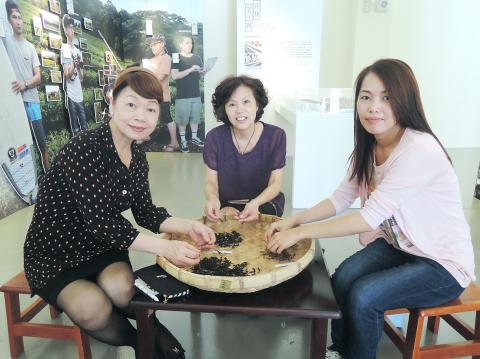The Pinglin Tea Museum, in the misty mountains of New Taipei City’s Pinglin District (坪林), has reopened its doors after being closed for a year for renovations.
The 18-year-old museum decided to paint its traditional Fujian-style red brick courtyard building a deeper gray and changed its interior design to make more “dynamic and dexterous” use of interior space.
Given that the main entrance to the museum is up four sets of steps, it also adding ramps to make it easier for physically challenged visitors to access the facilities.

Photo: Weng Yu-huang, Taipei Times
Presiding over Sunday’s reopening ceremony, New Taipei City Mayor Eric Chu (朱立倫) said that he hoped the renovated museum would help give its visitors a deeper understanding of Taiwan’s rich tea culture.
The museum now has different rooms where visitors can learn how to make tea, learn the origins of Pinglin’s different types of tea and learn to appreciate tea culture through live presentations and technologically interactive classrooms, Chu said.
Visitors would be able to learn about the different colors of tea that result from different tea leaves, and smell the difference in tea leaves, the museum said.
Museum officials said that the museum will periodically change its exhibitions in a bid to attract repeat visitors and have them see something new each time.
The museum invited “Tea Party,” a group recognized by iF Communication Design last year for being influential in innovating tea culture, to demonstrate how to enjoy tea culture in modern life, as well as asking renowned tea connoisseur Lin Ping-hui (林炳輝) to Sunday’s event.
To help local students learn the importance of their family’s trade and perhaps nudging them to take over from their parents when they grow up, the museum also invited junior-high school students to learn about tea.
We hope that by experiencing tea culture these students also come to appreciate the history of Pinglin and help carry that glory into the future, Sixth Pinglin Tea Room plantation manager Su Wen-sung (蘇文松) said.
The museum also hopes that its reopening special exhibitions on Pinglin tea and the English tea culture would help connection Taiwan’s tea culture with that of the wider world, museum director Liu Yi-ju (劉一儒) said.
The museum is open from 9am to 5pm on weekdays and stays open an hour later on weekends. It is closed the first Monday of each month, Lunar New Year’s Eve and Lunar New Year’s Day.

The Ministry of Education (MOE) is to launch a new program to encourage international students to stay in Taiwan and explore job opportunities here after graduation, Deputy Minister of Education Yeh Ping-cheng (葉丙成) said on Friday. The government would provide full scholarships for international students to further their studies for two years in Taiwan, so those who want to pursue a master’s degree can consider applying for the program, he said. The fields included are science, technology, engineering, mathematics, semiconductors and finance, Yeh added. The program, called “Intense 2+2,” would also assist international students who completed the two years of further studies in

Former president Tsai Ing-wen (蔡英文) departed for Europe on Friday night, with planned stops in Lithuania and Denmark. Tsai arrived at Taiwan Taoyuan International Airport on Friday night, but did not speak to reporters before departing. Tsai wrote on social media later that the purpose of the trip was to reaffirm the commitment of Taiwanese to working with democratic allies to promote regional security and stability, upholding freedom and democracy, and defending their homeland. She also expressed hope that through joint efforts, Taiwan and Europe would continue to be partners building up economic resilience on the global stage. The former president was to first

Taiwan will now have four additional national holidays after the Legislative Yuan passed an amendment today, which also made Labor Day a national holiday for all sectors. The Chinese Nationalist Party (KMT) and Taiwan People’s Party (TPP) used their majority in the Legislative Yuan to pass the amendment to the Act on Implementing Memorial Days and State Holidays (紀念日及節日實施辦法), which the parties jointly proposed, in its third and final reading today. The legislature passed the bill to amend the act, which is currently enforced administratively, raising it to the legal level. The new legislation recognizes Confucius’ birthday on Sept. 28, the

The Taipei District Court sentenced babysitters Liu Tsai-hsuan (劉彩萱) and Liu Jou-lin (劉若琳) to life and 18 years in prison respectively today for causing the death of a one-year-old boy in December 2023. The Taipei District Prosecutors’ Office said that Liu Tsai-hsuan was entrusted with the care of a one-year-old boy, nicknamed Kai Kai (剴剴), in August 2023 by the Child Welfare League Foundation. From Sept. 1 to Dec. 23 that year, she and her sister Liu Jou-lin allegedly committed acts of abuse against the boy, who was rushed to the hospital with severe injuries on Dec. 24, 2023, but did not